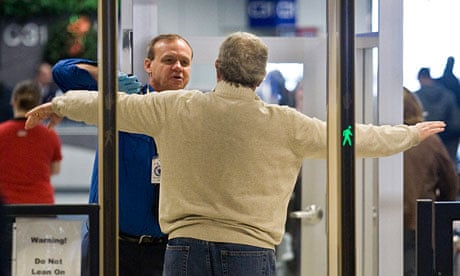Smiths Group became the latest company to warn that looming government spending cuts would hurt its bottom line, as the maker of airport security scanning equipment reported better-than-expected full-year results.
The firm said pre-tax profit jumped by 17% to £435m in the year to 31 July as it cut the cost of running back office functions such as human resources and finance and drove down the procurement costs of the goods and services it uses.
But Philip Bowman, the group's chief executive,, which makes everything from bomb detectors to medical devices and fuel hoses, cautioned that "constraints on government spending will continue to affect sales growth".
Bowman said about a fifth of Smiths' £2.7bn of sales last year came from government-related contracts around the world, casting a cloud over a key part of its business for the foreseeable future. The UK accounts for about 4% of revenues across the group, which counts the UK Ministry of Defence, airports operator BAA, and the US department of defence as clients.
Bowman said: "Clearly governments around the world, especially in the developing world, are going to be cutting costs, which is going to present challenges over the medium term."
Keith Bowman, an analyst at Hargreaves Lansdown, said: "The results themselves are pretty solid but the price for the credit crisis has still yet to be paid. Smiths is certainly not alone in having question marks over government spending, this is something the whole market is contending with."
Smiths' warning comes ahead of a meeting tomorrow convened by Francis Maude, the Cabinet Office minister, with more than 30 of the state's biggest suppliers. The talks will include representatives from accounting firms Deloitte, Ernst & Young and KPMG, and construction firm Balfour Beatty, and will to address the terms of their contracts.
Smiths joins Connaught, the collapsed council house maintenance firm, schools IT company RM Group, construction firm Balfour Beatty and telecoms group Cable & Wireless Worldwide in warning about the impact of the forthcoming government spending cuts, which are widely expected to be the most severe since the second world war.
But Philip Bowman said the economic uncertainty went far beyond government spending cuts: "Banks are rebuilding their balance sheets, Ireland is going back into recession and various forms of tax increases are going to affect consumer demand and so economic conditions are likely to remain challenging."
Smiths' so-called detection unit was the best performing of its five divisions, reporting a 43% jump in operating profit to £90m on the back of a 15% rise in sales to £574m. The unit, which is piloting a new body imaging system that detects items concealed under clothing, is benefiting from a rise in airport security spending following the attempted terrorist attack on a flight from Amsterdam to Detroit on Christmas Day last year.
Bowman said the unit, which also makes X-ray and trace detection systems, is likely to benefit from the withdrawal of British and American troops from Iraq and Afghanistan.
"I wouldn't be surprised if there were opportunities for selling detection equipment as they beef up security screening of cargo and people," he said.
Smiths maintained its full-year dividend payout at 34p a share. Its £435m profit is comfortably ahead of analysts' forecast of £383m. However, in a research note Credit Suisse analyst Andre Kukhnin anticipated only a "small upgrade" to his forecast for earnings before interest, tax, depreciation and amortisation this year because "the company continues to highlight the uncertain macroeconomic conditions and government spending restrictions".
The group's shares fell by 18p, or -1.48%, to close at £11.96.
